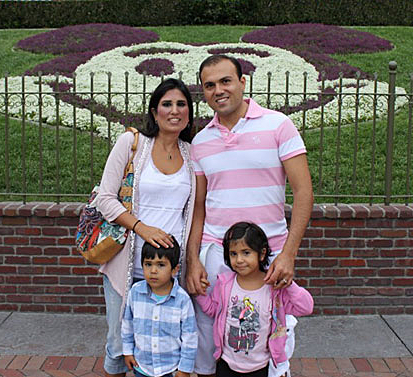
UPDATE 1/16/16—Saeed Abedini Among 5 Americans Released by Iran–Great news for the Abedini family!
UPDATE 7/22/15—Obama calls on Iran to release ‘unjustly detained’ Americans including Pastor Saeed Abedini
UPDATE 11/7/13—American Pastor Saeed Abedini Abruptly Moved to More Dangerous Prison–ACLJ
UPDATE 4/5/13: USA Today reports that movement to free Saeed is gaining momentum.
UPDATE 3/22/13: State Department Makes First Proactive Statement Calling for Saeed’s Release at UN
By Patricia Caso/March 15, 2013
Photos: American Center for Law and Justice
TWITTER: @NaghmehAbedini
Imagine receiving a call in the middle of the night that your husband has been arrested, dragged away to a notorious prison in Iran and charged with attempting to undermine the government. Naghmeh Abedini found herself in just that horrifying situation. Today, almost six months after her husband, Pastor Saeed Abedini, was incarcerated, she will be testifying in front of the House of Representatives’ Human Rights Commission to focus attention on gaining his freedom.
“In the midst of all this, I still find that peace and strength. There is despair all around me. I should be crumbling right now, but I’m not.” Naghmeh Abedini
Naghmeh and Saeed, both American citizens, share the love of their homeland and the Iranian people. Saeed was working in Iran developing their project to build an orphanage for homeless, abandoned children on property he inherited.
The Iranian government approved their humanitarian work in advance. Yet, at midnight on September 26th, 2012, Naghmeh received word of her husband’s arrest. The family in Iran now reports that he has been beaten, tortured and needs medical attention, but is alive.
The last time Naghmeh heard Saeed’s voice was on January 9, 2013. When I spoke to her, I was humbled and amazed at how she deals with this unimaginable international situation. At the same time, she is single-handedly raising two children in Idaho and struggling to make ends meet. Her strength is undeniable…
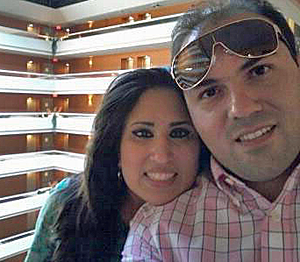 EYE: Did you have any idea that the Iranian government would arrest Saeed?
EYE: Did you have any idea that the Iranian government would arrest Saeed?
NAGHMEH: No. The humanitarian work was suggested by them. That’s the confusing thing about them. If they didn’t want us there, they should not have given us approval. So, even though we knew there were threats against those who were Christians, my husband hadn’t started house churches up again and we were doing what we agreed to with humanitarian efforts.
They had given approval. The current Revolutionary Guard, which are more fanatical and radical, see Christianity as more and more of a threat. Saeed had been under house arrest for two months, but they promised that would be resolved.
EYE: How did you find out about Saeed’s abduction?
NAGHMEH: I got a frantic call around midnight, our time, which is around 9 or 10am their time. His mother was crying, hysterically. “They took him. They took Saeed. They came. They raided our house!”
I was in complete shock! I never thought I’d be hearing that. It was a pretty horrific night. I didn’t sleep because I was comforting his family. We didn’t know where he was; I was trying to calm myself. The first thing that came to my mind was, “What am I going to tell the kids?”
EYE: Your children are six and four years old. How did you handle the difficult situation?
NAGHMEH: Since he’d been under house arrest for two months, Saeed would call and he would see them on the computer. He would comfort them, saying, “I can’t come home right now. I love you.” Now, I didn’t know what to tell them. So I decided not to tell them anything for the first month.
They would keep coming around the computer and asking “Where’s Daddy? Can’t we talk to him on the computer?” I’d say “No, it’s not a good time, maybe another time.” I was praying that in a month he would be released.
“We needed to know where he was. We needed to know he was alive.”
EYE: How did you find out where Saeed was and how he was doing?
NAGHMEH: Family members got a message to the government somehow that his wife was going to go to media. We needed to know where he was. We needed to know he was alive. Soon after we got a call from Saeed saying, “I am in Evin prison. I am in solitary confinement. I’m okay.”
That’s how our journey started with that prison and then following up on his case. Through prison visits and some phone calls after Saeed’s month in solitary, we knew there were horrific conditions; that the guards had beaten him; and that he has serious medical conditions because of that.
EYE: Why did you wait so long to reach out to the media for awareness?
NAGHMEH: We didn’t go to the media until December 19, 2012, three months after he was taken, because they kept promising us that if we met bail, they would let him out. If we didn’t make too much fuss or too much noise, they would work with us and just let him out, which unfortunately did not happen.
As Saeed’s physical situation seemed to get worse and we came to the conclusion that the Iranian government had no intention of setting Saeed free, we decided to move forward with media. Eventually, Saeed got an 8-year sentence, which can be a death sentence in that prison.
EYE: Is there anything our State Department can do despite strained relations between the two countries?
NAGHMEH: Yes. The US government is now more involved since the media came out. They assured me that they are doing what they can. They are making some diplomatic efforts, which they cannot talk about in detail, and they are taking more steps.
“The kids still pray at night and hope that he will come home any day.”
EYE: What is most troubling for you?
NAGHMEH: I worry about Saeed’s health most. I haven’t told the kids about the 8-year sentence yet. Saeed is threatened every day. He is being abused every day. And he’s being told he will die. They want him to give up his faith.
The kids still pray at night and hope that he will come home any day. My biggest worry is that they plan to see Daddy and it’s not going to happen. They are so hopeful. In phone calls, Saeed would tell me that “the hardest torture is being away from the kids.” He would tear up hearing their voices and get very choked up and emotional.
EYE: And, what is most frustrating for you?
NAGHMEH: Frustration is working with the Iranian government. His family is under house arrest. I don’t know when the government will take them. They’ve been told they will come and get them any day, and then I will have no way to find out anything about Saeed.
They have told Saeed that we didn’t come up with bail. We did. Saeed was told by the Guards that he would be home for Christmas. False hope. It was printed in the government newspaper that Saeed would be freed on January 21st and that didn’t happen.
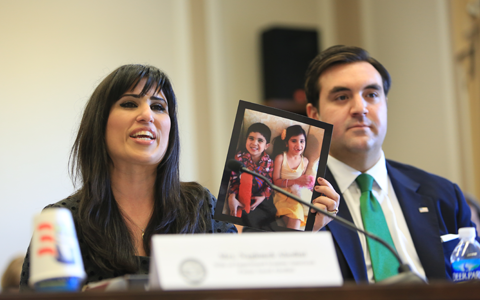
the Human Rights Commission in Congress
EYE: Is this orphanage as much a passion for you as it is for Saeed?
NAGHMEH: Yes. The Bible says that serving the orphans and the widows is true religion because they are helpless. They really can’t give anything back. So that was our heart, to help the orphans who don’t have anything. At this point the government is really not allowing anything to be done. They are threatened with our presence there.
“It is illegal for a woman to ride a bike. Women cannot be out and active in society.”
EYE: What is life like for women in Iran since you worked there alongside your husband?
NAGHMEH: It is very difficult. I was very limited in my travels. Women are driving more but are really harassed for doing so. It is illegal for a woman to ride a bike. Women cannot be out and active in society. It was like a cell for me there because I was used to working out, going on runs, doing active stuff and speaking my mind. That is not accepted.
EYE: How do you survive?
NAGHMEH: Saeed is a Mission Pastor but does not have his own church. When we came to the US, he had jobs off and on, but since Farsi is his language, it was very difficult. Along with the economic downturn, many people were not interested in hiring him.
I started picking up some jobs part-time to have some kind of insurance for the family as well as to have an income. Working from home with a flexible schedule allows me to do my business when the kids are at school, sleeping, etc.
EYE: Whom do you turn to for advice and support?
NAGHMEH: My lawyer, Tiffany Barrans, has been a great source of support in prayer and advice. My church family here in Boise, and all over the world through social media, have been great sources of support as well. They have showered me with their prayer, encouragement and their love.
“I have nights when I am reminded of Saeed and our times together and I weep.”
EYE: How do you get any sleep at night? Do you ever just let yourself have a good cry before going forward with strength and faith?
NAGHMEH: I have nights when I am reminded of Saeed and our times together and I weep. Night times are also difficult for my kids and they cry.
They miss him so much, and it makes it extra hard for me. I usually sleep for a few hours and am jolted awake for some reason, waiting for some news. It is morning in Iran time when I sleep, and so I take a few hour naps at night.
Mornings are easier for me…I get drawn into the craziness of getting the kids up and ready and moving on with a busy day. When the day is done, I am exhausted. It is when I start getting the kids ready for bed that I am reminded of my husband, and how I wish he were here.
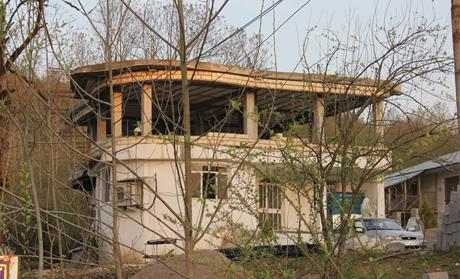
EYE: Have you changed with all this turmoil?
NAGHMEH: Definitely. I would have thought I would just crawl into a corner and cry and be done, but I’ve grown in my faith and have seen how real it is. In the midst of all this, I still find that peace and strength. There is despair all around me. I should be crumbling right now, but I’m not.
And, there is a God; Jesus is real and is holding me up. I’m still having peace and still having joy. I look at it and I’m amazed. The Bible says: “He gives us peace beyond understanding that the world can’t take away from us.” And that’s what I am experiencing now.
“I know we are both passionate about helping the orphans. If he were released, we would have more drive to continue to reach out and help and minister to others.“
EYE: How would your life change with your husband’s release?
NAGHMEH: Our family would be back together again. It seems so broken now without him. There are just so many things that the kids and I miss about him and having him in our life. I know we are both passionate about helping the orphans. If he were released, we would have more drive to continue to reach out and help and minister to others.
EYE: What hope do you have?
NAGHMEH: The Bible says: “Everything works out for good for those who love Him.” There will be good that comes out of this. For now, the Iranian government has stopped our work with the orphans, Saeed’s passion for serving his people and even sharing his faith.
A CNN blogger wrote a few weeks ago that he was a Muslim and that if the Iranian government has tried to silence Saeed, they’ve given him more of a platform to speak from.
So, that’s our desire. Rather than silence Saeed, we hope this has actually caused more of an open door for him to speak about his passion; what is in his heart; what God has called him to do with the orphans.
EYE: Thank you, Naghmeh, for sharing your story. Our hearts and prayers go out to you and your children with the hope of Saeed’s safe return. Your determination and faith are remarkable!
###
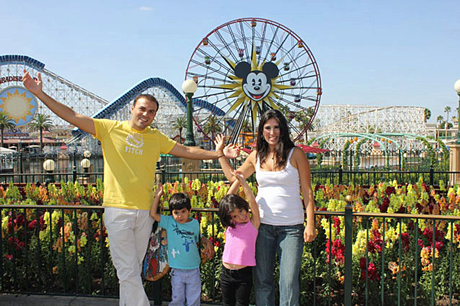



Leave a Reply